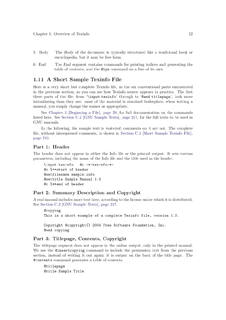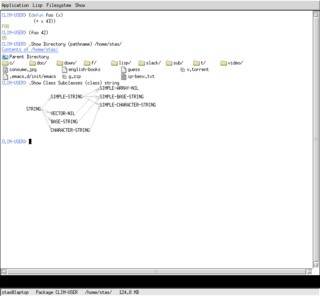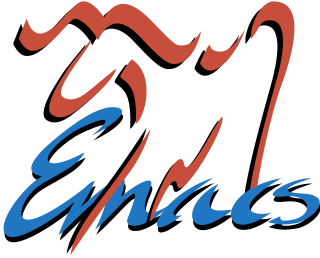The editor war is the rivalry between users of the Emacs and vi text editors. The rivalry has become a lasting part of hacker culture and the free software community.

Emacs Lisp is a dialect of the Lisp programming language used as a scripting language by Emacs. It is used for implementing most of the editing functionality built into Emacs, the remainder being written in C, as is the Lisp interpreter. Emacs Lisp is also termed Elisp, although there is also an older, unrelated Lisp dialect with that name.

An integrated development environment (IDE) is a software application that provides comprehensive facilities to computer programmers for software development. An IDE normally consists of at least a source code editor, build automation tools and a debugger. Some IDEs, such as NetBeans and Eclipse, contain the necessary compiler, interpreter, or both; others, such as SharpDevelop and Lazarus, do not.

XEmacs is a graphical- and console-based text editor which runs on almost any Unix-like operating system as well as Microsoft Windows. XEmacs is a fork, based on a version of GNU Emacs from the late 1980s. Any user can download, use, and modify XEmacs as free software available under the GNU General Public License version 2 or any later version.
| latest release date = | operating system = Unix, VMS | programming language = C | genre = Text editor | license = }} Gosling Emacs is a discontinued Emacs implementation written in 1981 by James Gosling in C.

Genera is a commercial operating system and integrated development environment for Lisp machines developed by Symbolics. It is essentially a fork of an earlier operating system originating on the Massachusetts Institute of Technology (MIT) AI Lab's Lisp machines which Symbolics had used in common with Lisp Machines, Inc. (LMI), and Texas Instruments (TI). Genera is also sold by Symbolics as Open Genera, which runs Genera on computers based on a Digital Equipment Corporation (DEC) Alpha processor using Tru64 UNIX. It is released and licensed as proprietary software.

Maxima is a computer algebra system (CAS) based on a 1982 version of Macsyma. It is written in Common Lisp and runs on all POSIX platforms such as macOS, Unix, BSD, and Linux, as well as under Microsoft Windows and Android. It is free software released under the terms of the GNU General Public License (GPL).

Texinfo is a typesetting syntax used for generating documentation in both on-line and printed form with a single source file. It is implemented by a computer program released as free software of the same name, created and made available by the GNU Project from the Free Software Foundation.

GNU Ubiquitous Intelligent Language for Extensions is the preferred extension language system for the GNU Project and features an implementation of the programming language Scheme. Its first version was released in 1993. In addition to large parts of Scheme standards, Guile Scheme includes modularized extensions for many different programming tasks.
This article provides basic comparisons for notable text editors. More feature details for text editors are available from the Category of text editor features and from the individual products' articles. This article may not be up-to-date or necessarily all-inclusive.
In computing, minimalism refers to the application of minimalist philosophies and principles in the design and use of hardware and software. Minimalism, in this sense, means designing systems that use the least hardware and software resources possible.
Hemlock is a free Emacs text editor for most POSIX-compliant Unix systems. It follows the tradition of the Lisp Machine editor ZWEI and the ITS/TOPS-20 implementation of Emacs, but differs from XEmacs or GNU Emacs, the most popular Emacs variants, in that it is written in Common Lisp rather than Emacs Lisp and C—although it borrows features from the later editors. Hemlock was originally written by the CMU Spice project in Spice Lisp for the PERQ computer.
EINE and ZWEI are two discontinued Emacs-like text editors developed by Daniel Weinreb and Mike McMahon for Lisp machines in the 1970s and 1980s.

The Common Lisp Interface Manager (CLIM) is a Common Lisp-based programming interface for creating user interfaces, i.e., graphical user interfaces (GUIs). It provides an application programming interface (API) to user interface facilities for the programming language Lisp. It is a fully object-oriented programming user interface management system, using the Common Lisp Object System (CLOS) and is based on the mechanism of stream input and output. There are also facilities for output device independence. It is descended from the GUI system Dynamic Windows of Symbolics' Lisp machines between 1988 and 1993.
... you can check out Common Lisp Interface Manager (CLIM). A descendant of the Symbolics Lisp machines GUI framework, CLIM is powerful but complex. Although many commercial Common Lisp implementations actually support it, it doesn't seem to have seen a lot of use. But in the past couple years, an open-source implementation of CLIM, McCLIM – now hosted at Common-Lisp.net – has been picking up steam lately, so we may be on the verge of a CLIM renaissance. – From Practical Common Lisp

Aquamacs is an Emacs text editor for macOS. It is based on GNU Emacs, currently tracking the GNU Emacs version 25.3 branch. Although GNU Emacs has had native UI support on macOS using the Cocoa API since version 23, Aquamacs modifies the user interface to conform with macOS standards in favor of Emacs standards.
Daniel L. Weinreb was an American computer scientist and programmer, with significant work in the environment of the programming language Lisp.

GNU Emacs is a free software text editor. It was created by GNU Project founder Richard Stallman. In common with other varieties of Emacs, GNU Emacs is extensible using a Turing complete programming language. GNU Emacs has been called "the most powerful text editor available today". With proper support from the underlying system, GNU Emacs is able to display files in multiple character sets, and has been able to simultaneously display most human languages since at least 1999. Throughout its history, GNU Emacs has been a central component of the GNU project, and a flagship of the free software movement. GNU Emacs is sometimes abbreviated as GNUMACS, especially to differentiate it from other EMACS variants. The tag line for GNU Emacs is "the extensible self-documenting text editor".
Clozure CL (CCL) is a Common Lisp implementation. It implements the full ANSI Common Lisp standard with several extensions. It contains a command line development environment, an experimental integrated development environment (IDE) for Mac OS X using the Hemlock editor, and can also be used with SLIME. Clozure CL is open source and the project is hosted by Clozure Associates.

Emacs or EMACS is a family of text editors that are characterized by their extensibility. The manual for the most widely used variant, GNU Emacs, describes it as "the extensible, customizable, self-documenting, real-time display editor". Development of the first Emacs began in the mid-1970s, and work on its direct descendant, GNU Emacs, continues actively as of 2020.
McCLIM is an implementation of the Common Lisp Interface Manager (CLIM), for the programming language Common Lisp. The project is named partly after Mike McDonald, the person who began it. It is free and open-source software released under the GNU Lesser General Public License (LGPL) version 2.1.









